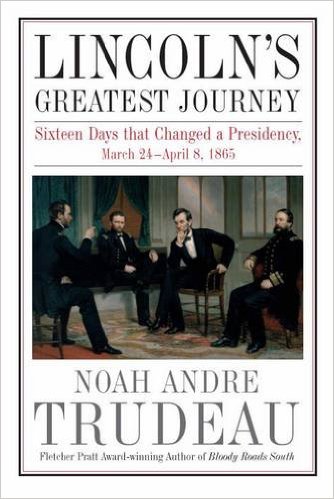Book Review: “Lincoln’s Greatest Journey: Sixteen Days that Changed a Presidency, March 24—April 8, 1865”
The historiography of the United States’ 16th president is remarkable. For over 15,000 times, Abraham Lincoln has been the center of focus for historians and students of history. With such an overwhelming amount of research, one wonders if every stone has been uncovered in discerning Lincoln’s life. With a new study, Noah Andre Trudeau proves that, in fact the answer to that question is a resounding no, and there is still plenty out there to be found.
Trudeau has authored Lincoln’s Greatest Journey: Sixteen Days that Changed a Presidency, March 24—April 8, 1865 (Savas Beatie, 2016). This new study zeroes in on the trip that Lincoln took in the last days of March—even the last days of his life—leaving behind the confines of Washington, D.C. and making his way to City Point, the headquarters for General-in-Chief Ulysses S. Grant. As Trudeau writes, the trip “succeeded in restoring” Lincoln, rejuvenating the tired executive and posturing him for the end of the Civil War (252).
Utilizing the same narrative style that he has used before in studies about Sherman’s March to the Sea and the Battle of Gettysburg, Trudeau breaks the trip down by day. This style makes it very easy to follow what Lincoln does each day of his extended stay at City Point.
Lincoln’s visit to City Point has certainly been studied and written about beforehand, but Lincoln’s Greatest Journey adds to our understanding of what happened at City Point during the closing chapter of the Civil War. Trudeau used sources such as naval record books to track Lincoln’s voyage down to Virginia and from there, where he went such as to the captured Confederate capital, Richmond. While citing these under-utilized sources, Trudeau also revisits older accounts, examining the validity or reliability of sources that have been frequently been told and retold. For example, Trudeau looks at the oft-cited tale of Mary Todd Lincoln being an almost impossible-to-please visitor who jealously peered at others who got close to her husband. While admitting that Mary Todd did indeed feel slighted at times during the trip, Trudeau tries to lay to rest the tale of Mary being a wholly petulant, writing, “Contrary to the negative accounts of Mrs. Lincoln’s behavior, she seemed at times to enjoy herself” (62).
This book is not just the story of Lincoln, however. Trudeau also covers to some extent the military maneuvers around the trenches of Petersburg, accompanied by maps that will be familiar to readers of another of Trudeau’s work, The Last Citadel. By covering the battles and actions, Trudeau keeps the reader aware of events surrounding Lincoln’s trip. These battles also lead to one of the most memorable occasions for Lincoln’s stay, when he visited multiple corps hospitals to shake the hands of some 5,000 wounded soldiers over the course of an afternoon.
Skeptical readers who may think the trip and intentions formed there for the end of the war were all for naught because of Lincoln’s assassination just days after returning to Washington should put those skepticisms aside. Lincoln’s visit to City Point, his meetings with Grant, William Sherman, David Porter, and his triumphant entry into Richmond “matters because it adds a new piece to the eternally fascinating puzzle that is Abraham Lincoln,” Trudeau writes (xii). “It matters also because although no one knows precisely what Lincoln would have done in a full second term, his experiences at City Point offer tantalizing clues to some of what might have been” (xii).
The story certainly does matter, and Trudeau has given it its rightful justice. Lincoln’s Greatest Journey would be a welcomed addition to any Civil War library.
Earlier this summer, Emerging Civil War contributor Chris Kolakowski interviewed Trudeau about this book. The interview can be found here.
Noah Andre Trudeau
Lincoln’s Greatest Journey: Sixteen Days that Changed a Presidency, March 24—April 8, 1865
Savas Beatie, 2016.
329 Pages
2 Appendixes, Bibliography, Endnotes, Index.

Ryan, many thanks for posting this. I encourage everyone to give this book a read. You will not be disappointed. As always, we appreciate your support.
My pleasure, Ted. The review’s also been posted to Amazon.